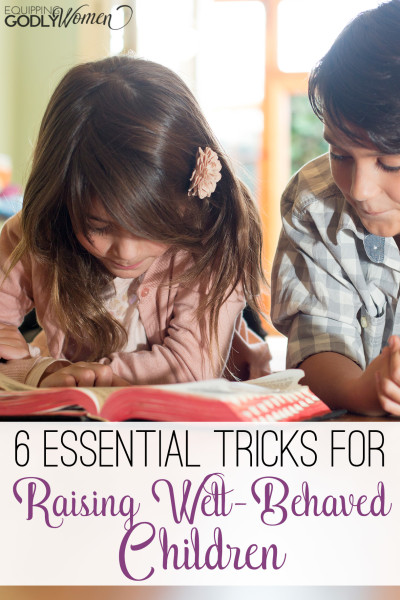 If there’s one thing every parent wants, it’s well-behaved children.
If there’s one thing every parent wants, it’s well-behaved children.
Whether our reasons are selfish (they are easier to raise!) or selfless (it prepares them for life), pretty much every parent would agree: we want our kids to behave!
Raising well-behaved children is almost always easier said than done, however.
Between our own failings and insecurities and a society that often works its hardest to produce just the opposite, raising well-behaved kids can be quite the feat.
Thankfully, just because it may be difficult doesn’t mean it has to be impossible.
If your children haven’t been on their best behavior lately and you’d like to change that sooner rather than later, these six tips can help.
*This post contains affiliate links, which means if you make a purchase, I may make a small commission at no additional cost to you. This helps cover the many costs of running this site and allows me to help provide for my growing family. Thank you!
1. Equip Yourself
When I was pregnant with my first child, I seriously read pretty much every single book in the library about babies, parenting, sleep, etc. After all, why would I want to stumble through parenting making lots of mistakes when I could learn from those who had done it already? As a result, I got a TON of great advice that really impacted my parenting in a positive way.
Well, chances are, you don’t have days on end to read every parenting book like I did, so let me just break it down for you. These five are absolute MUST reads for the early days (Seriously. They’re amazing).
TEACH Your Children How to Behave by Brittany Ann (that’s me!)

Secrets of the Baby Whisperer: How to Calm, Connect, and Communicate with Your Baby by Tracy Hogg and Melinda Blau
Bringing Up Bébé: One American Mother Discovers the Wisdom of French Parenting by Pamela Druckerman
What to Expect the First Year by Heidi Murkoff and Sharon Mazel
2. Be Clear In Your Expectations
How can your children behave appropriately if you don’t first tell them what appropriate behavior is? Young children don’t automatically know how to behave at church. in the library or at a restaurant–you have to spell it out for them, preferably before you get there.
For example, on the way to church, you might say: “We are headed to church. Church is a place where people go to worship God, and they don’t want to be distracted by little children running, talking or playing. At church, we sit in our seats and are quiet and still. After church is over, we will go to the park, and you can run and be noisy there.”
Obviously, the exact wording you use will depend on the age of your child and whether you’ve already been over the routine before.
If you’ve already laid the ground rules, you may just cover the bases as you’re pulling in the parking lot. “Do we talk in church? Do we walk around at church? Do we distract other people? Good.”
3. Teach Them How to Perform Essential Actions
Of course, just because your children know what they are supposed to do doesn’t automatically mean that they know how to do it. Take cleaning their room, for example. While the concept may be simple for you, it can be completely overwhelming for a small child who doesn’t know where to start.
Whether you want your child to sit still, make his bed, brush her teeth or wait politely while you talk on the phone, you will probably need to show your child how. At least, if you want the task done correctly.
The first step in this process is telling your children exactly what you need them to do, but that’s only the first step.
You also have to give good directions, set the right consequences and follow through in a timely and consistent manner. Raising well-behaved kids requires a lot of work and follow through, but it’s worth it!
** For a detailed breakdown of the exact method I use to get my children to listen the first time, get along, do their chores and generally be pleasant to be around, be sure to check out my book, TEACH Your Children How to Behave.
It walks you step-by-step through exactly what you need to do to get well-behaved children who listen the first time.
My kids aren’t perfect (they are kids after all!), but they are really good, kind, well-mannered kids the majority of the time, and this books shares the exact strategy I use every day to help make that happen.
4. Be Consistent
When it comes to discipline, consistency is key. Otherwise, if you get in the habit of ignoring behaviors or giving in to demands, your children will learn that all they have to do is act up and they will get their way. Once you set rules, stick to them.
Consistency may be difficult at first–you may feel like the worst mother in the world–but once your children see that you mean what you say, they will have no reason to fight you on it. This can help behavior tremendously.
And once you do this over time, it becomes second nature for everyone.
5. Model Excellent Behavior Yourself
Honestly, I think one of that hardest parts of parenting is simply remembering to model excellent behavior yourself. All of us have issues we struggle with, and kids sure seem to have a knack for picking them up and repeating them at the most inappropriate times!
It only makes sense, though. If your child sees that you yell when you are frustrated, he will learn to do the same. If your child sees that you are rude to pretty much everyone, she will learn to do the same. After all, how can a child learn a life skill that they haven’t seen modeled?
It’s always a good check for me to hear the words and tone coming out of my children’s mouths and to know that they got them from me. Am I saying words and behaving in a way that I want them to repeat?
6. Hand Out Grace as Needed
When is the last time you went an entire day without making any mistakes? If you’re like most people, it’s probably been a while! It should come as no surprise then that our children will make plenty of mistakes as well. After all, we know the rules; they are still learning.
It isn’t your job to be perfect and it isn’t your child’s job either. You both need grace, love and acceptance, no matter how many times you mess up. Parenting isn’t about being perfect, and it isn’t about raising perfect kids either. As long as you’re doing your best, chances are you and your children are going to turn out just fine. And these six tips will help 🙂
Is parenting generally difficult or easy for you? What part do you struggle with the most?



Great tips Brittany! I think the toughest part for me is staying consistent. It’s hard not to give in when they fuss and complain. I’m a work in progress and so are my kids. 🙂
Aren’t we all! I haven’t been the best with consistency lately either!
My mist read for new parents is Baby Minds. Has actual hands on activities spelled out for what to do with kids as well as detailed descriptions about what babies of certain ages are likely to be capable of.
I think another big one is to refrain from spoiling your child. No child needs the plethora of toys and electronics that are all the rage today. I believe by teaching children very early that things don’t make you happy, your child not only learns to be more inventive and imaginative but also the value of money and waste. My kids, now 23 and 26, we’re raised in the beginning of the electronic phase, or the decline of humanity as I call it, but they did not get every new video game, toy etc. And the ones they did have. Had limits, one hour a day, no more. The rest of play time was outside being active whenever possible, if not then they had to play with their toys or make things etc. I also think teaching children to do chores from an early age is a must, and not for an allowance, just for the responsibility of it. Great points in the post. Ty.
Thanks Brittany.
Krista, you have a great point there. My Kids are still young and I think I should be more disciplined in terms of how much electronics time they should have. Its beneficial to give room to creative play and most importantly balance things up.
J
My 2.5 years old daughter throw her food on carpet. I’ve tried so many ways to tell her that its not a good thing but she don’t understand.. I want my daughter to be well behaved child. Plz help give some tips. As she is so young toddler.
What do you do when she throws it? Do you continually pick it up and give her more or give some kind of reaction?
For me, I’d just say “Okay, if you don’t want to eat, then don’t eat.” and let her go play. The thing is, kids who are hungry, eat. If a child isn’t eating, they probably aren’t that hungry. And when the next meal comes around, she’ll be nice and hungry and I bet she won’t throw her food.
If you can’t wait until the next meal to feed her, at least wait an hour or two before you try again. And you might cut back on juice and snacks to make sure she is nice and hungry before meal times.
Just what I would do!
Thanks for these tips! Another book I found very helpful was Healthy Sleep Habits, Happy Child. It provided interesting information about the importance of sleep as well as practical tips on helping our Littles accomplish that very critical task! I’m also about to start reading Shepherding a Child’s Heart, which I hear helps us focus on their hearts and what drives our Littles’ behavior. It’s not only outward behavior that will get them to heaven one day but where their hearts are.
Thanks for the recommendations!